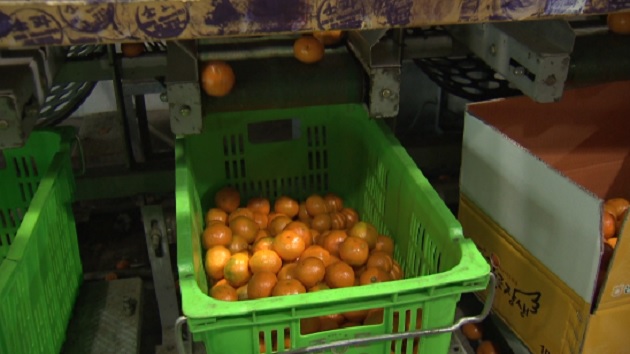
The province decided to additionally take small sized mandarin oranges off the market after it decided to purchase 30,000 tons of large sized mandarin oranges to make processed goods.
This is to raise the crop’s market price, as the fruit’s prices have been remaining sluggish this year.
Joseph Kim reports.
[slug] Jungmun Mandarin Distribution Center
Workers at a mandarin packing house put small fruits into separate containers.
[slug] Mandarin producers stop shipping small fruits voluntarily
All of the mandarins that reach a level of 10 degrees or higher on the Brix sugar scale can be placed on the market, regardless of size.
But mandarin growers have voluntarily stopped shipping small crops to the market from early this month.
[slug] Mandarin producers control supply
The recent price plunge has led the National Agricultural Cooperative Federation to the decision.
[slug] Mandarin price set at 5,900won/5kg
The price of outdoor grown mandarins is set at 5,900 won per 5 kilograms on average.
[slug] Price plunge from 8,000-9,000won/5kg in 2018
Last year, the price was between 8,000 and 9,000 won per 5 kilograms.
Economic downturn and mandarin quality degradation have led to a decrease in mandarin consumption.
[slug] Province joins supply control
The province has joined the mandarin supply control as there is no sign of price recovery.
[slug] Province to buy 20,000 tons from Dec. 16-Jan.27
The province has been buying large mandarins still meeting the size standard, and selling them to processing plants from yesterday(Dec.16) through January 27.
[slug] Standard size mandarin separation in 5 years
The separation of mandarins that meet the size standard is being made for the first time in 5 years.
[slug] Province buys mandarin at 300won/kg, 6 bln won to be spent
The province buys oversize mandarins at 300 won per kilogram, and 6 billion won will be spent on the purchase.
If the measure proves to be ineffective, the province will consider the purchase of smaller mandarins too.
[Reporter] Joseph Kim
[Camera] Kim Seung-cheol
The contingency plan is part of the province’s long-term strategy to improve citrus quality and consumption monitoring efforts.
Joseph Kim, KCTV





